BLO2206 Australian Taxation Law: Foreigner vs Resident Tax Treatment
VerifiedAdded on 2023/06/04
|7
|1423
|234
Report
AI Summary
This report analyzes the tax treatments for foreigners and Australian residents under the Income Tax Assessment Act 1997, highlighting key differences in how income is assessed and taxed. It discusses the implications of these treatments for foreigners, including obligations related to personal service income, superannuation, and potential tax exemptions under double taxation agreements. The report also examines the impact of recent legislative changes on foreigners relocating to Australia, noting the complexities they face in navigating the Australian taxation system and explains the differences in marginal tax rates and interest taxation between residents and non-residents, along with the obligations of foreign businesses operating in Australia.
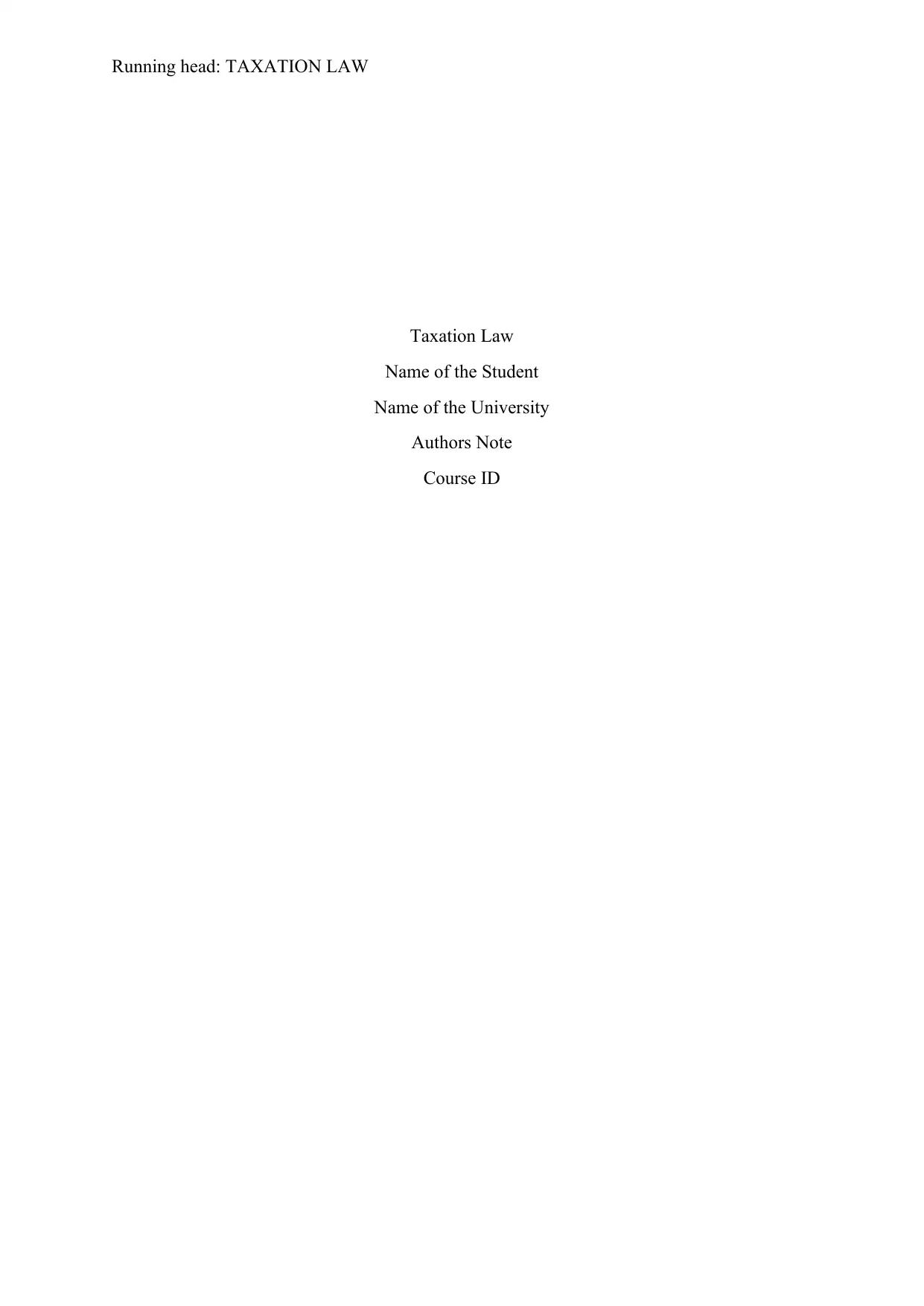
Running head: TAXATION LAW
Taxation Law
Name of the Student
Name of the University
Authors Note
Course ID
Taxation Law
Name of the Student
Name of the University
Authors Note
Course ID
Paraphrase This Document
Need a fresh take? Get an instant paraphrase of this document with our AI Paraphraser
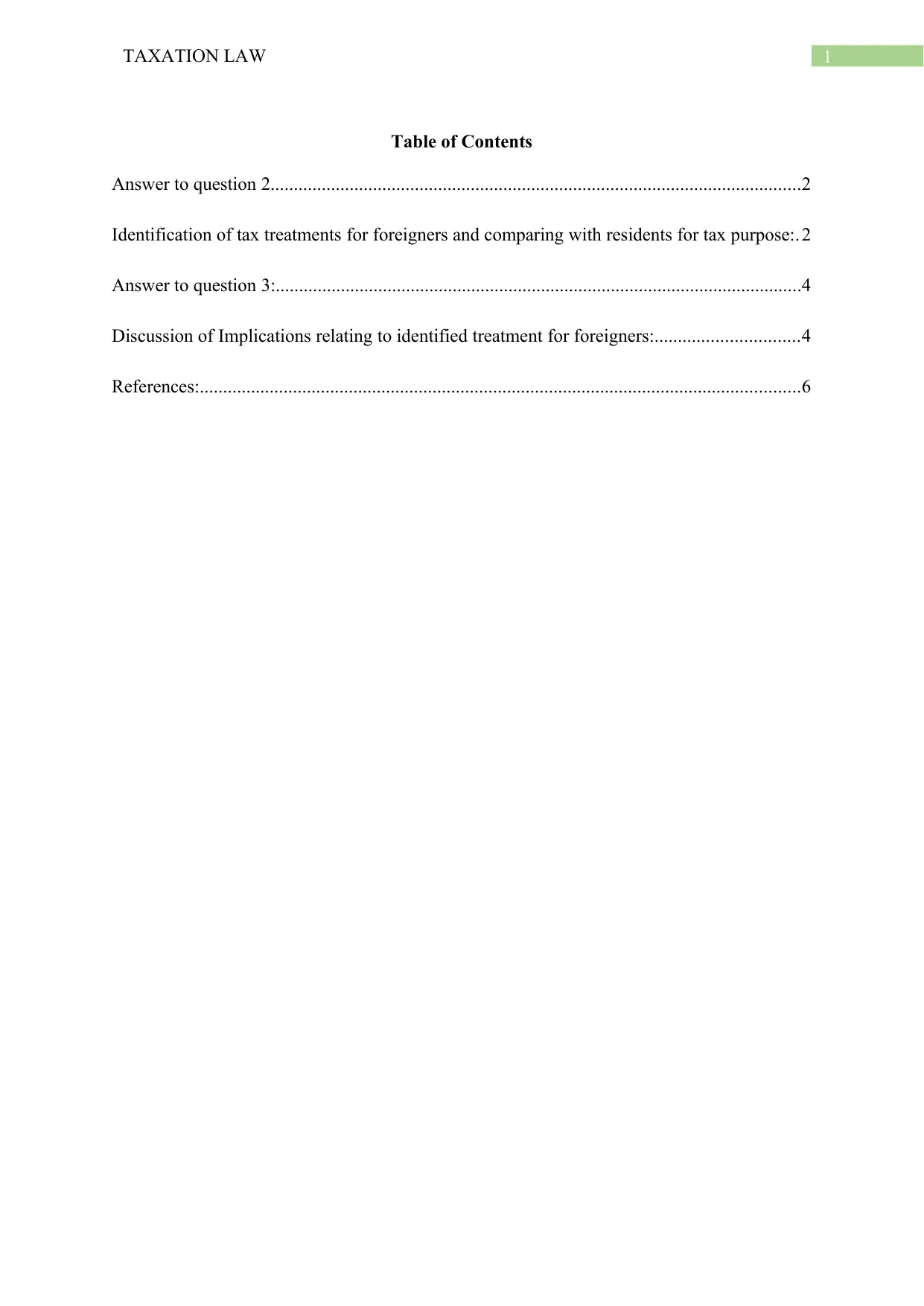
1TAXATION LAW
Table of Contents
Answer to question 2..................................................................................................................2
Identification of tax treatments for foreigners and comparing with residents for tax purpose:. 2
Answer to question 3:.................................................................................................................4
Discussion of Implications relating to identified treatment for foreigners:...............................4
References:.................................................................................................................................6
Table of Contents
Answer to question 2..................................................................................................................2
Identification of tax treatments for foreigners and comparing with residents for tax purpose:. 2
Answer to question 3:.................................................................................................................4
Discussion of Implications relating to identified treatment for foreigners:...............................4
References:.................................................................................................................................6
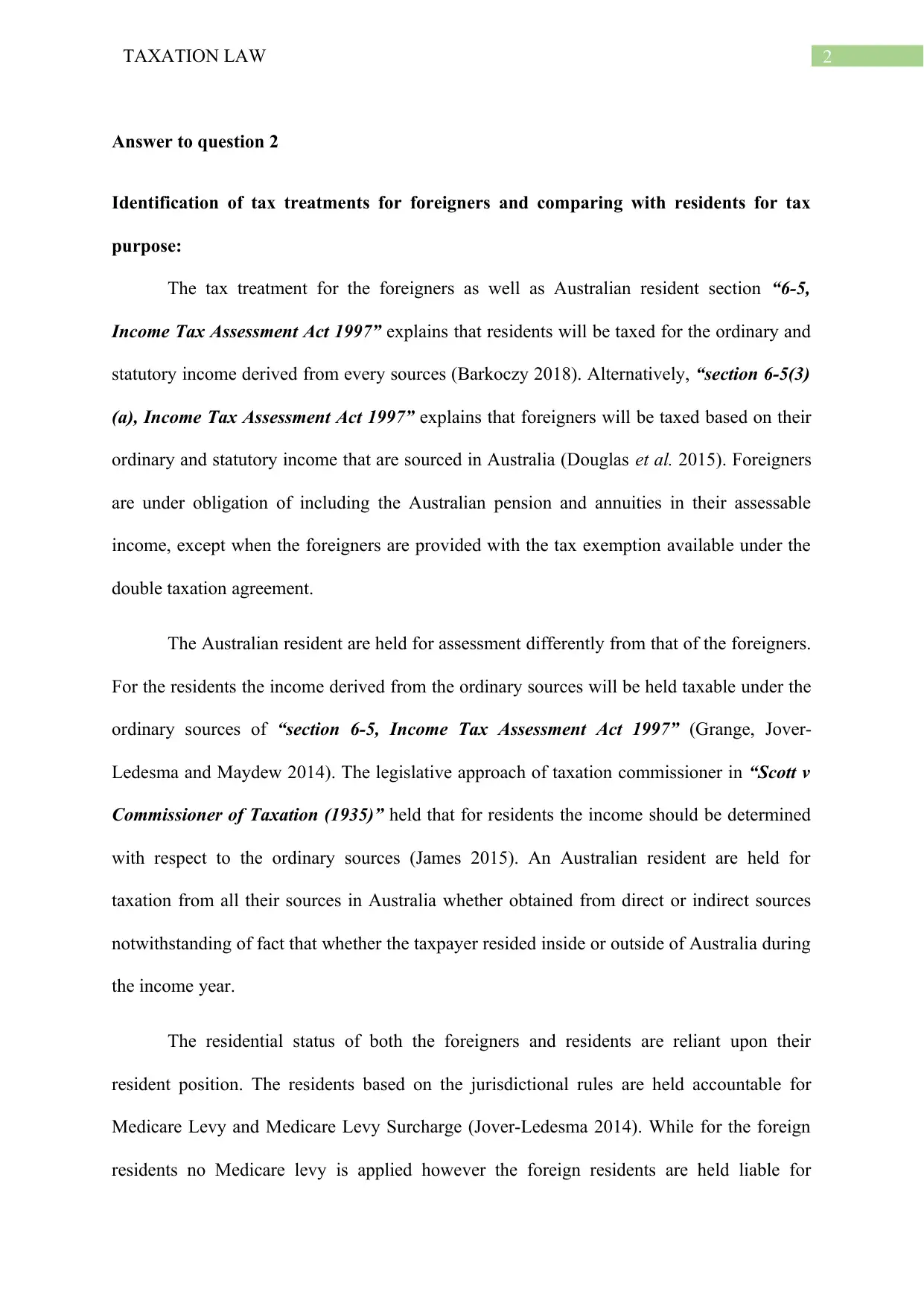
2TAXATION LAW
Answer to question 2
Identification of tax treatments for foreigners and comparing with residents for tax
purpose:
The tax treatment for the foreigners as well as Australian resident section “6-5,
Income Tax Assessment Act 1997” explains that residents will be taxed for the ordinary and
statutory income derived from every sources (Barkoczy 2018). Alternatively, “section 6-5(3)
(a), Income Tax Assessment Act 1997” explains that foreigners will be taxed based on their
ordinary and statutory income that are sourced in Australia (Douglas et al. 2015). Foreigners
are under obligation of including the Australian pension and annuities in their assessable
income, except when the foreigners are provided with the tax exemption available under the
double taxation agreement.
The Australian resident are held for assessment differently from that of the foreigners.
For the residents the income derived from the ordinary sources will be held taxable under the
ordinary sources of “section 6-5, Income Tax Assessment Act 1997” (Grange, Jover-
Ledesma and Maydew 2014). The legislative approach of taxation commissioner in “Scott v
Commissioner of Taxation (1935)” held that for residents the income should be determined
with respect to the ordinary sources (James 2015). An Australian resident are held for
taxation from all their sources in Australia whether obtained from direct or indirect sources
notwithstanding of fact that whether the taxpayer resided inside or outside of Australia during
the income year.
The residential status of both the foreigners and residents are reliant upon their
resident position. The residents based on the jurisdictional rules are held accountable for
Medicare Levy and Medicare Levy Surcharge (Jover-Ledesma 2014). While for the foreign
residents no Medicare levy is applied however the foreign residents are held liable for
Answer to question 2
Identification of tax treatments for foreigners and comparing with residents for tax
purpose:
The tax treatment for the foreigners as well as Australian resident section “6-5,
Income Tax Assessment Act 1997” explains that residents will be taxed for the ordinary and
statutory income derived from every sources (Barkoczy 2018). Alternatively, “section 6-5(3)
(a), Income Tax Assessment Act 1997” explains that foreigners will be taxed based on their
ordinary and statutory income that are sourced in Australia (Douglas et al. 2015). Foreigners
are under obligation of including the Australian pension and annuities in their assessable
income, except when the foreigners are provided with the tax exemption available under the
double taxation agreement.
The Australian resident are held for assessment differently from that of the foreigners.
For the residents the income derived from the ordinary sources will be held taxable under the
ordinary sources of “section 6-5, Income Tax Assessment Act 1997” (Grange, Jover-
Ledesma and Maydew 2014). The legislative approach of taxation commissioner in “Scott v
Commissioner of Taxation (1935)” held that for residents the income should be determined
with respect to the ordinary sources (James 2015). An Australian resident are held for
taxation from all their sources in Australia whether obtained from direct or indirect sources
notwithstanding of fact that whether the taxpayer resided inside or outside of Australia during
the income year.
The residential status of both the foreigners and residents are reliant upon their
resident position. The residents based on the jurisdictional rules are held accountable for
Medicare Levy and Medicare Levy Surcharge (Jover-Ledesma 2014). While for the foreign
residents no Medicare levy is applied however the foreign residents are held liable for
⊘ This is a preview!⊘
Do you want full access?
Subscribe today to unlock all pages.

Trusted by 1+ million students worldwide
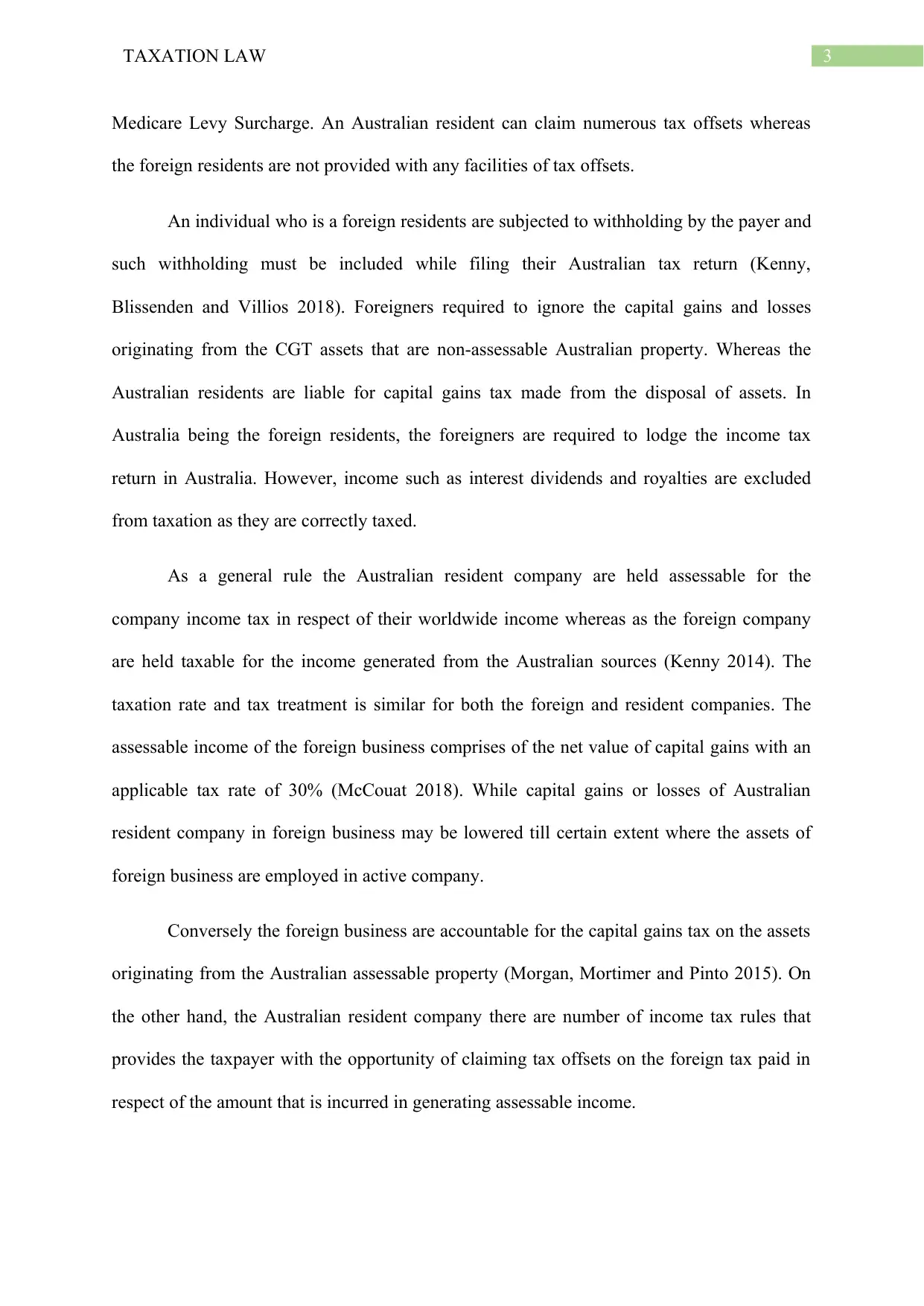
3TAXATION LAW
Medicare Levy Surcharge. An Australian resident can claim numerous tax offsets whereas
the foreign residents are not provided with any facilities of tax offsets.
An individual who is a foreign residents are subjected to withholding by the payer and
such withholding must be included while filing their Australian tax return (Kenny,
Blissenden and Villios 2018). Foreigners required to ignore the capital gains and losses
originating from the CGT assets that are non-assessable Australian property. Whereas the
Australian residents are liable for capital gains tax made from the disposal of assets. In
Australia being the foreign residents, the foreigners are required to lodge the income tax
return in Australia. However, income such as interest dividends and royalties are excluded
from taxation as they are correctly taxed.
As a general rule the Australian resident company are held assessable for the
company income tax in respect of their worldwide income whereas as the foreign company
are held taxable for the income generated from the Australian sources (Kenny 2014). The
taxation rate and tax treatment is similar for both the foreign and resident companies. The
assessable income of the foreign business comprises of the net value of capital gains with an
applicable tax rate of 30% (McCouat 2018). While capital gains or losses of Australian
resident company in foreign business may be lowered till certain extent where the assets of
foreign business are employed in active company.
Conversely the foreign business are accountable for the capital gains tax on the assets
originating from the Australian assessable property (Morgan, Mortimer and Pinto 2015). On
the other hand, the Australian resident company there are number of income tax rules that
provides the taxpayer with the opportunity of claiming tax offsets on the foreign tax paid in
respect of the amount that is incurred in generating assessable income.
Medicare Levy Surcharge. An Australian resident can claim numerous tax offsets whereas
the foreign residents are not provided with any facilities of tax offsets.
An individual who is a foreign residents are subjected to withholding by the payer and
such withholding must be included while filing their Australian tax return (Kenny,
Blissenden and Villios 2018). Foreigners required to ignore the capital gains and losses
originating from the CGT assets that are non-assessable Australian property. Whereas the
Australian residents are liable for capital gains tax made from the disposal of assets. In
Australia being the foreign residents, the foreigners are required to lodge the income tax
return in Australia. However, income such as interest dividends and royalties are excluded
from taxation as they are correctly taxed.
As a general rule the Australian resident company are held assessable for the
company income tax in respect of their worldwide income whereas as the foreign company
are held taxable for the income generated from the Australian sources (Kenny 2014). The
taxation rate and tax treatment is similar for both the foreign and resident companies. The
assessable income of the foreign business comprises of the net value of capital gains with an
applicable tax rate of 30% (McCouat 2018). While capital gains or losses of Australian
resident company in foreign business may be lowered till certain extent where the assets of
foreign business are employed in active company.
Conversely the foreign business are accountable for the capital gains tax on the assets
originating from the Australian assessable property (Morgan, Mortimer and Pinto 2015). On
the other hand, the Australian resident company there are number of income tax rules that
provides the taxpayer with the opportunity of claiming tax offsets on the foreign tax paid in
respect of the amount that is incurred in generating assessable income.
Paraphrase This Document
Need a fresh take? Get an instant paraphrase of this document with our AI Paraphraser
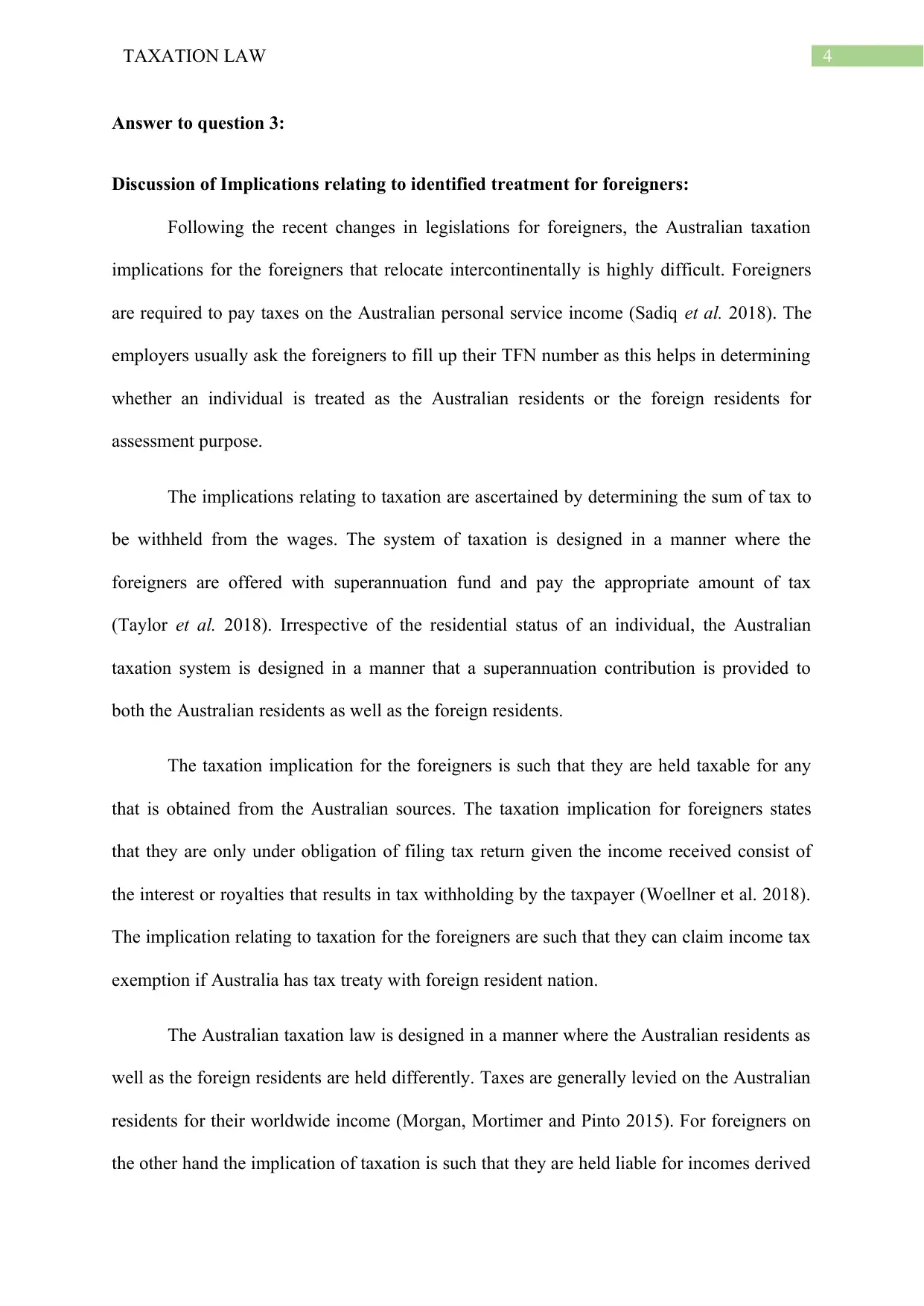
4TAXATION LAW
Answer to question 3:
Discussion of Implications relating to identified treatment for foreigners:
Following the recent changes in legislations for foreigners, the Australian taxation
implications for the foreigners that relocate intercontinentally is highly difficult. Foreigners
are required to pay taxes on the Australian personal service income (Sadiq et al. 2018). The
employers usually ask the foreigners to fill up their TFN number as this helps in determining
whether an individual is treated as the Australian residents or the foreign residents for
assessment purpose.
The implications relating to taxation are ascertained by determining the sum of tax to
be withheld from the wages. The system of taxation is designed in a manner where the
foreigners are offered with superannuation fund and pay the appropriate amount of tax
(Taylor et al. 2018). Irrespective of the residential status of an individual, the Australian
taxation system is designed in a manner that a superannuation contribution is provided to
both the Australian residents as well as the foreign residents.
The taxation implication for the foreigners is such that they are held taxable for any
that is obtained from the Australian sources. The taxation implication for foreigners states
that they are only under obligation of filing tax return given the income received consist of
the interest or royalties that results in tax withholding by the taxpayer (Woellner et al. 2018).
The implication relating to taxation for the foreigners are such that they can claim income tax
exemption if Australia has tax treaty with foreign resident nation.
The Australian taxation law is designed in a manner where the Australian residents as
well as the foreign residents are held differently. Taxes are generally levied on the Australian
residents for their worldwide income (Morgan, Mortimer and Pinto 2015). For foreigners on
the other hand the implication of taxation is such that they are held liable for incomes derived
Answer to question 3:
Discussion of Implications relating to identified treatment for foreigners:
Following the recent changes in legislations for foreigners, the Australian taxation
implications for the foreigners that relocate intercontinentally is highly difficult. Foreigners
are required to pay taxes on the Australian personal service income (Sadiq et al. 2018). The
employers usually ask the foreigners to fill up their TFN number as this helps in determining
whether an individual is treated as the Australian residents or the foreign residents for
assessment purpose.
The implications relating to taxation are ascertained by determining the sum of tax to
be withheld from the wages. The system of taxation is designed in a manner where the
foreigners are offered with superannuation fund and pay the appropriate amount of tax
(Taylor et al. 2018). Irrespective of the residential status of an individual, the Australian
taxation system is designed in a manner that a superannuation contribution is provided to
both the Australian residents as well as the foreign residents.
The taxation implication for the foreigners is such that they are held taxable for any
that is obtained from the Australian sources. The taxation implication for foreigners states
that they are only under obligation of filing tax return given the income received consist of
the interest or royalties that results in tax withholding by the taxpayer (Woellner et al. 2018).
The implication relating to taxation for the foreigners are such that they can claim income tax
exemption if Australia has tax treaty with foreign resident nation.
The Australian taxation law is designed in a manner where the Australian residents as
well as the foreign residents are held differently. Taxes are generally levied on the Australian
residents for their worldwide income (Morgan, Mortimer and Pinto 2015). For foreigners on
the other hand the implication of taxation is such that they are held liable for incomes derived
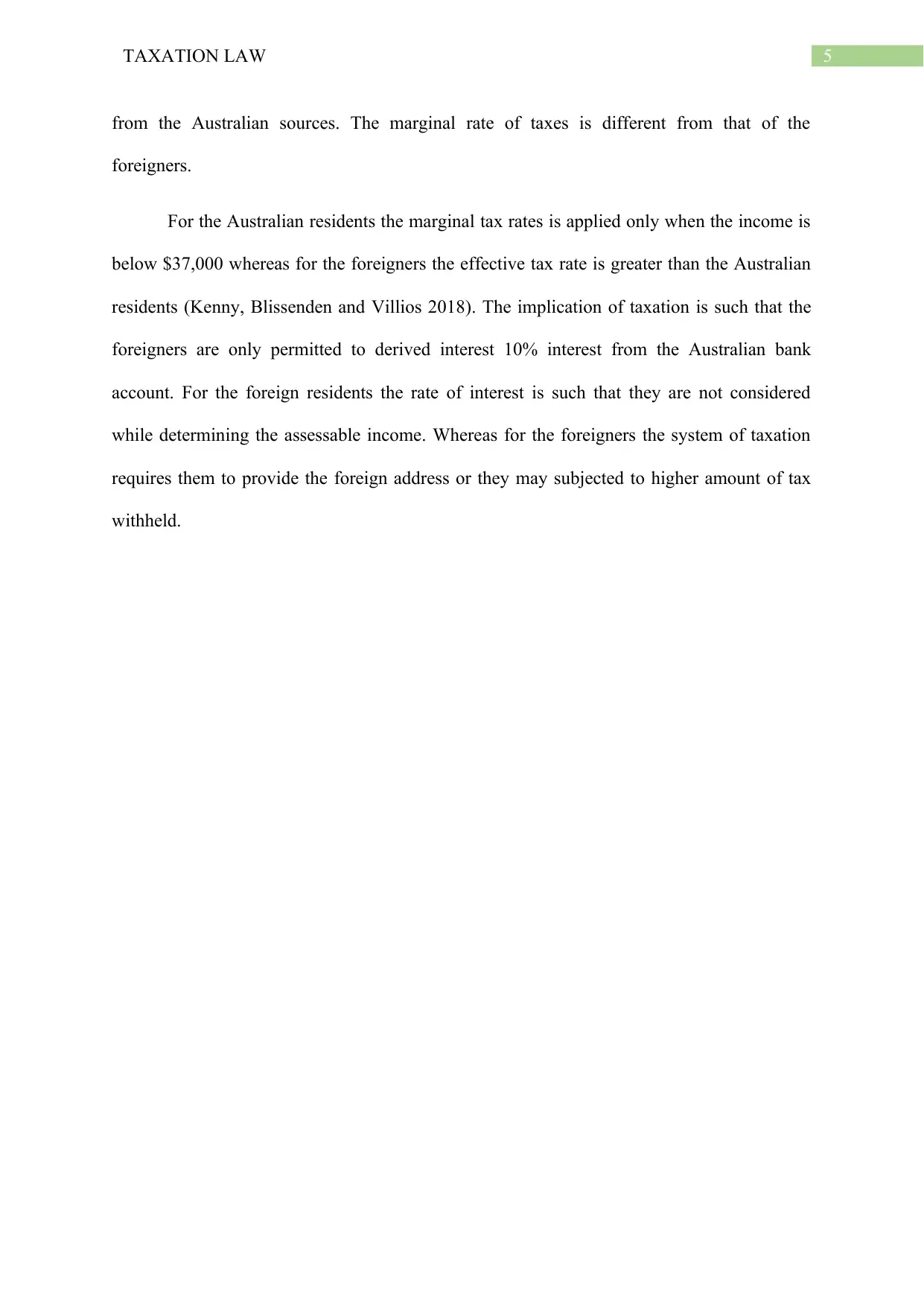
5TAXATION LAW
from the Australian sources. The marginal rate of taxes is different from that of the
foreigners.
For the Australian residents the marginal tax rates is applied only when the income is
below $37,000 whereas for the foreigners the effective tax rate is greater than the Australian
residents (Kenny, Blissenden and Villios 2018). The implication of taxation is such that the
foreigners are only permitted to derived interest 10% interest from the Australian bank
account. For the foreign residents the rate of interest is such that they are not considered
while determining the assessable income. Whereas for the foreigners the system of taxation
requires them to provide the foreign address or they may subjected to higher amount of tax
withheld.
from the Australian sources. The marginal rate of taxes is different from that of the
foreigners.
For the Australian residents the marginal tax rates is applied only when the income is
below $37,000 whereas for the foreigners the effective tax rate is greater than the Australian
residents (Kenny, Blissenden and Villios 2018). The implication of taxation is such that the
foreigners are only permitted to derived interest 10% interest from the Australian bank
account. For the foreign residents the rate of interest is such that they are not considered
while determining the assessable income. Whereas for the foreigners the system of taxation
requires them to provide the foreign address or they may subjected to higher amount of tax
withheld.
⊘ This is a preview!⊘
Do you want full access?
Subscribe today to unlock all pages.

Trusted by 1+ million students worldwide
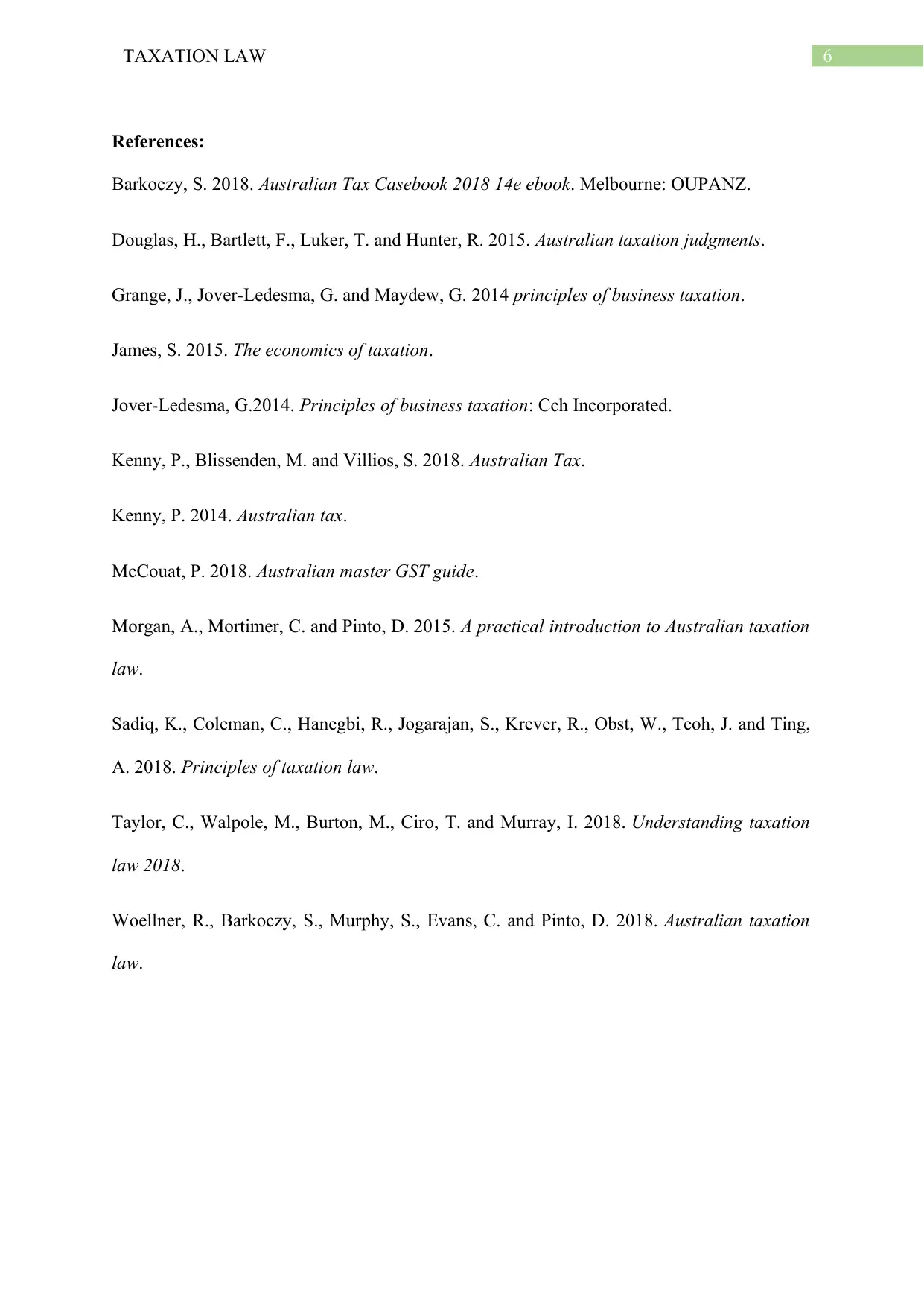
6TAXATION LAW
References:
Barkoczy, S. 2018. Australian Tax Casebook 2018 14e ebook. Melbourne: OUPANZ.
Douglas, H., Bartlett, F., Luker, T. and Hunter, R. 2015. Australian taxation judgments.
Grange, J., Jover-Ledesma, G. and Maydew, G. 2014 principles of business taxation.
James, S. 2015. The economics of taxation.
Jover-Ledesma, G.2014. Principles of business taxation: Cch Incorporated.
Kenny, P., Blissenden, M. and Villios, S. 2018. Australian Tax.
Kenny, P. 2014. Australian tax.
McCouat, P. 2018. Australian master GST guide.
Morgan, A., Mortimer, C. and Pinto, D. 2015. A practical introduction to Australian taxation
law.
Sadiq, K., Coleman, C., Hanegbi, R., Jogarajan, S., Krever, R., Obst, W., Teoh, J. and Ting,
A. 2018. Principles of taxation law.
Taylor, C., Walpole, M., Burton, M., Ciro, T. and Murray, I. 2018. Understanding taxation
law 2018.
Woellner, R., Barkoczy, S., Murphy, S., Evans, C. and Pinto, D. 2018. Australian taxation
law.
References:
Barkoczy, S. 2018. Australian Tax Casebook 2018 14e ebook. Melbourne: OUPANZ.
Douglas, H., Bartlett, F., Luker, T. and Hunter, R. 2015. Australian taxation judgments.
Grange, J., Jover-Ledesma, G. and Maydew, G. 2014 principles of business taxation.
James, S. 2015. The economics of taxation.
Jover-Ledesma, G.2014. Principles of business taxation: Cch Incorporated.
Kenny, P., Blissenden, M. and Villios, S. 2018. Australian Tax.
Kenny, P. 2014. Australian tax.
McCouat, P. 2018. Australian master GST guide.
Morgan, A., Mortimer, C. and Pinto, D. 2015. A practical introduction to Australian taxation
law.
Sadiq, K., Coleman, C., Hanegbi, R., Jogarajan, S., Krever, R., Obst, W., Teoh, J. and Ting,
A. 2018. Principles of taxation law.
Taylor, C., Walpole, M., Burton, M., Ciro, T. and Murray, I. 2018. Understanding taxation
law 2018.
Woellner, R., Barkoczy, S., Murphy, S., Evans, C. and Pinto, D. 2018. Australian taxation
law.
1 out of 7
Related Documents
Your All-in-One AI-Powered Toolkit for Academic Success.
+13062052269
info@desklib.com
Available 24*7 on WhatsApp / Email
![[object Object]](/_next/static/media/star-bottom.7253800d.svg)
Unlock your academic potential
Copyright © 2020–2026 A2Z Services. All Rights Reserved. Developed and managed by ZUCOL.




